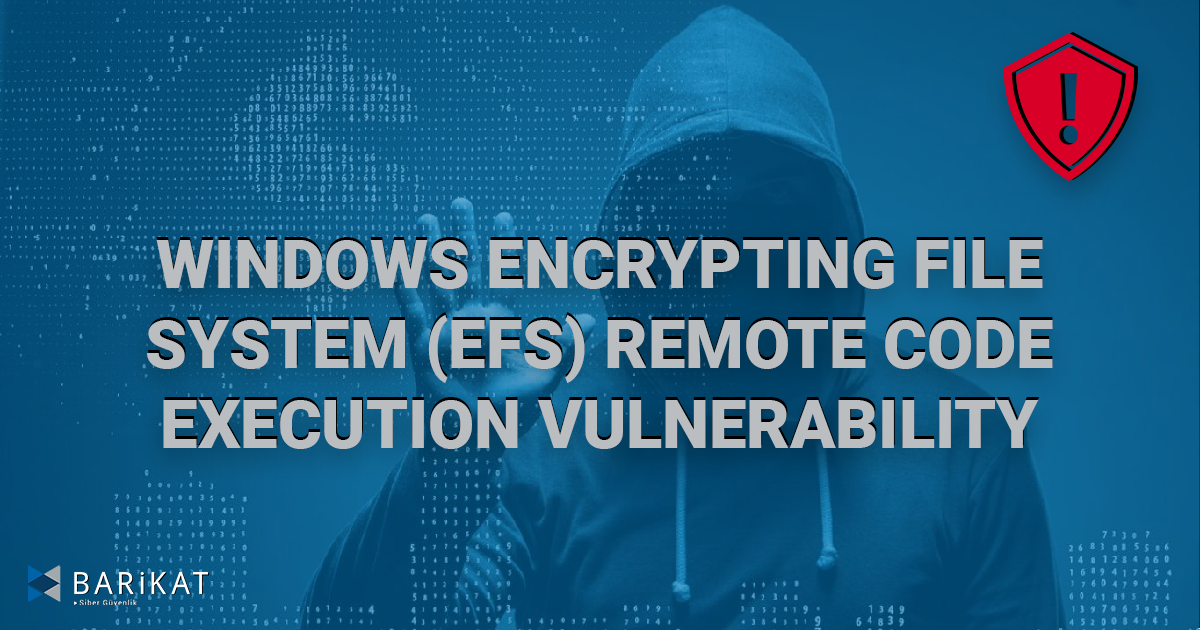Windows Encrypting File System (EFS) Remote Code Execution Vulnerability
A critical* Windows Encrypting File System (EFS) Remote Code Execution Vulnerability with a CVSS 3.1 score of 9.8 was released.

An attacker who successfully exploits this vulnerability can run arbitrary code in the context of the system user. Even though no exploit regarding this vulnerability has been discovered, due to its severity/criticality, it is highly recommended that the following patches are downloaded to ensure the safety of systems/assets.
Affected Systems
The following servers/systems are affected by this vulnerability;
- Windows Server 2012 R2 (Server Core installation)
- Windows Server 2012 R2
- Windows Server 2012 R2 (Server Core installation)
- Windows Server 2012
- Windows Server 2008 R2 for x64-based Systems Service Pack 1 (Server Core installation)
- Windows Server 2008 R2 for x64-based Systems Service Pack 1
- Windows Server 2008 for x64-based Systems Service Pack 2 (Server Core installation)
- Windows Server 2008 for x64-based Systems Service Pack 2
- Windows Server 2008 for 32-bit Systems Service Pack 2 (Server Core installation)
- Windows Server 2008 for 32-bit Systems Service Pack 2
- Windows RT 8.1
- Windows 8.1 for x64-based systems
- Windows 8.1 for 32-bit systems
- Windows 7 for x64-based Systems Service Pack 1
- Windows 7 for 32-bit Systems Service Pack 1
- Windows Server 2016 (Server Core installation)
- Windows Server 2016
- Windows 10 Version 1607 for x64-based Systems
- Windows 10 Version 1607 for 32-bit Systems
- Windows 10 for x64-based Systems
- Windows 10 for 32-bit Systems
- Windows 10 Version 21H2 for x64-based Systems
- Windows 10 Version 21H2 for ARM64-based Systems
- Windows 10 Version 21H2 for 32-bit Systems
- Windows 11 for ARM64-based Systems
- Windows 11 for x64-based Systems
- Windows Server, version 20H2 (Server Core Installation)
- Windows 10 Version 20H2 for ARM64-based Systems
- Windows 10 Version 20H2 for 32-bit Systems
- Windows 10 Version 20H2 for x64-based Systems
- Windows Server, version 2004 (Server Core installation)
- Windows 10 Version 2004 for x64-based Systems
- Windows 10 Version 2004 for ARM64-based Systems
- Windows 10 Version 2004 for 32-bit Systems
- Windows Server 2022 (Server Core installation)
- Windows Server 2022
- Windows 10 Version 21H1 for 32-bit Systems
- Windows 10 Version 21H1 for ARM64-based Systems
- Windows 10 Version 21H1 for x64-based Systems
- Windows 10 Version 1909 for ARM64-based Systems
- Windows 10 Version 1909 for x64-based Systems
- Windows 10 Version 1909 for 32-bit Systems
- Windows Server 2019 (Server Core installation)
- Windows Server 2019
- Windows 10 Version 1809 for ARM64-based Systems
- Windows 10 Version 1809 for x64-based Systems
- Windows 10 Version 1809 for 32-bit Systems
IoC’s
-
Recommended Solution(s)
Organizations using the above-mentioned products in the affected systems section are recommended to download the patches in the link below.
https://msrc.microsoft.com/update-guide/en-US/vulnerability/CVE-2021-43217
CVE / CWE
CVE-2021-43217
Related Website(s)
- https://nvd.nist.gov/vuln/detail/CVE-2021-43217
- https://msrc.microsoft.com/update-guide/en-US/vulnerability/CVE-2021-43217
* Vulnerabilities with a CVSS 3.1 score between 7.0 and 8.9 are evaluated to be “high” whereas vulnerabilities with a CVSS 3.1 score between 9.0 and 10.0 are evaluated to be “critical”.
Current Security Vulnerability Reports
İSTANBUL
+90 216 504 53 32
Aydınevler Mahallesi,İsmet İnönü Cadddesi,Küçükyalı Ofis Park A Blok,No:20/1 Maltepe İstanbul
ANKARA
+90 312 235 44 51
VULNERABILITY NEWSLETTER
You can register to our newsletter on the home page to be instantly informed about security vulnerabilities.
